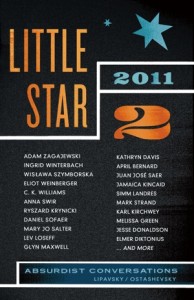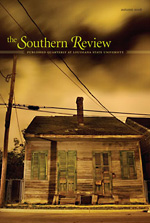 It’s been some months since the last Digest post; here’s a recap of some spring & summer news:
It’s been some months since the last Digest post; here’s a recap of some spring & summer news:
Literary magazines come and go at a rapid clip. For example: Charles McGrath once noted “the typical lifespan for a literary magazine appears to be roughly that of a major household appliance.” And when asked what the darkest moment in the history of magazine Grand Street was, editor Ben Sonnenberg answered simply, “When we ran out of money.” This past March, Open City announced it is ceasing publication due to lack of funds. In his introduction to They’re At It Again: Stories from Twenty Years of Open City, an anthology published in June celebrating the magazine’s rich history, magazine co-founder Thomas Beller questions the ability for literary magazines to be both timely and timeless. Somehow Open City managed both, pushing literary boundaries and supporting writers like Sam Lipsyte, Lara Vapnyar, and Jonathan Ames, who called the magazine “the new Paris Review” for his generation. Though its magazine arm has folded, Open City Books will continue publishing.
In The Guardian, New York Times, and elsewhere, many observe a contemporary literary magazine renaissance; thanks to the ease of online and desktop publishing, more magazines are arriving than disappearing. In May, Atticus Books launched Atticus Review under the banner “six degrees left of literature.” Such transitions aren’t new: Works in Progress and New American Review were both from major book publishers, as are Fifty-Two Stories and Five Dials today. Edited by Katrina Gray, Atticus Review is a weekly online journal bringing together “stories, poems, electric literature, and other genre-busting words of wisdom and interactive whimsy.” Interested writers should visit the submissions page on Submishmash.

The January premiere of the new Asymptote included 77 writers from 17 different languages featuring Thomas Bernhard, Mary Gaitskill, and Aimé Césaire. Its second issue in April included new work from José Saramago, Bharati Mukherjee, and Justin Taylor. Along with Words Without Borders and Cerise Press, Asymptote is part of a new strain of internationally focused online literary magazines with quality design and high editorial standards. Alongside a translation, the magazine makes the work available in its original language in both audio and text. Asymptote is continually looking for translated work and 1,500 word essays about relatively unknown authors writing in languages other than English at: editors@asymptotejournal.com.
A decade ago, David Barringer identified the “new graphic literary journal,” which gave greater attention to design and illustration to broaden audiences and “please a whole lot more.” Who doesn’t swoon over intricately designed issues of Ninth Letter and McSweeney’s? Yet Ann Kjellberg’s simply designed new Little Star stands out as an elegant exception to an increasingly flashy world of letters. Kjellberg worked on staff at The New York Review of Books and at Farrar, Straus & Giroux and is Joseph Brodsky’s literary executor, from whose poetry the magazine title is taken from. Reminiscent of another “little”—Margaret Anderson’s The Little Review, the early 20th century one-woman show that brought Joyce’s Ulysses to American readers—the first two issues of Little Star included work from Adam Zagajewski, C.K. Williams, and Jamaica Kincaid alongside the more experimental “Manifesto” from Padgett Powell and conversations between 1930s Russian avant-gardists. Issue three is expected in November. Little Star welcomes submissions of poetry and prose to: submissions@littlestarjournal.com.
Other magazines return from the grave. Vintage Books UK is giving Graham Greene’s 1930s literary weekly Night and Day a second life. The first returning issue included Zachary Mason’s retelling of Ovid’s Metamorphoses, Paul Batchelor’s translations of Rilke, and a conversation between Ali Smith and Chloe Aridjis. Issue two is the catastrophe issue. And after nearly a year hiatus, Identity Theory is back to its regular schedule. Launched by Matt Borondy in 2000 and most well known for its idiosyncratic fiction and trove of writer interviews, Identity Theory is looking for poetry and fiction submissions, as well as some staff positions. Visit their website for information.
 Though new literary magazines tend to eclipse preceding ones, nothing replaces lives lost. The Southern Review editor Jeanne Lieby died on April 19th in a tragic single-car accident in Louisiana. The first female editor of TSR, Leiby did much to revitalize the magazine over the past three years. A memorial fund has been established in memory of Leiby; information is available on the TSR website.
Though new literary magazines tend to eclipse preceding ones, nothing replaces lives lost. The Southern Review editor Jeanne Lieby died on April 19th in a tragic single-car accident in Louisiana. The first female editor of TSR, Leiby did much to revitalize the magazine over the past three years. A memorial fund has been established in memory of Leiby; information is available on the TSR website.
On Tuesdays, Travis Kurowski presents Luna Digest, a selection of news from the world of literary magazines. Travis is the editor of Luna Park, a magazine founded on the idea that journals are as deserving of critical attention as other artistic works.

Jul 5th, 2011 at 1:05 pm
Thanks, Travis, these articles are valuable, quite as important to a serious writer as the sports section might be to a b-ball fanatic.
Jul 6th, 2011 at 9:34 am
Yes, this was great,thank you Travis